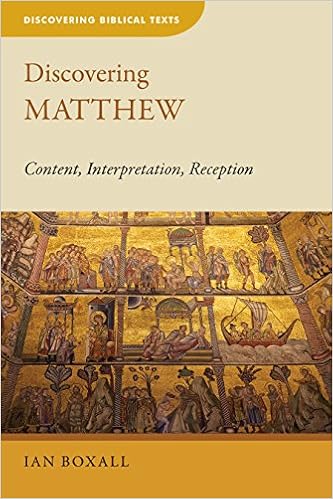In the next several months, I am going to roll out some series for Crux Sola that will help me blog a bit more intentionally and regularly. The first series (that will go on indefinitely) is the Friday Book Corner where I will do book notes, short book reviews, and longer multi-post reviews of major books. Today’s offerings are all related to Matthew or Mark.
 Ian Boxall, Discovering Matthew: Content, Interpretation, Reception (Eerdmans, 2015). The subtitle really says it all – Boxall (who has also written an excellent commentary on Revelation) introduces the text of Matthew in a concise way. First Boxall introduces the challenges of interpreting Matthew, various approaches to studying Matthew, then he engages with several key themes or blocks of Matthew (e.g., Infancy Narratives, Jesus fulfilling Law and Prophets). There are many fine introductions to Matthew out there, but I think Boxall’s unique contribution is really his interest in Matthew’s reception.
Ian Boxall, Discovering Matthew: Content, Interpretation, Reception (Eerdmans, 2015). The subtitle really says it all – Boxall (who has also written an excellent commentary on Revelation) introduces the text of Matthew in a concise way. First Boxall introduces the challenges of interpreting Matthew, various approaches to studying Matthew, then he engages with several key themes or blocks of Matthew (e.g., Infancy Narratives, Jesus fulfilling Law and Prophets). There are many fine introductions to Matthew out there, but I think Boxall’s unique contribution is really his interest in Matthew’s reception.
 Robert Gundry, Peter: False Disciple and Apostate according to Saint Matthew (Eerdmans, 2015). The reality is that, indeed, Matthew’s Gospel is hard on Peter, but Gundry goes as far as to argue that Matthew wished to portray Peter as a false disciple. Having read through Gundry’s arguments, I think this theory is plausible, but there is no convincing evidence – and Gundry acknowledges that the other gospels tend to demonstrate a fallible, “dull” even, but rehabilitated Peter. It is hard to imagine Matthew wanting to present this portrayal in light of what appears to be strong leadership from Peter in the early church.
Robert Gundry, Peter: False Disciple and Apostate according to Saint Matthew (Eerdmans, 2015). The reality is that, indeed, Matthew’s Gospel is hard on Peter, but Gundry goes as far as to argue that Matthew wished to portray Peter as a false disciple. Having read through Gundry’s arguments, I think this theory is plausible, but there is no convincing evidence – and Gundry acknowledges that the other gospels tend to demonstrate a fallible, “dull” even, but rehabilitated Peter. It is hard to imagine Matthew wanting to present this portrayal in light of what appears to be strong leadership from Peter in the early church.
 David Garland, The Theology of Mark’s Gospel (Zondervan, 2015). This book is an incredible achievement and a highly valuable resource. This work, at over 600 pages, explores nearly every nook and cranny of Mark’s thought and Garland draws from his significant expertise in Gospels studies (including a wonderful commentary on Mark, and also on Luke and Matthew). Towards the beginning of the volume, Garland offers his own reading of Mark’s Gospel which almost amounts to a mini-commentary in and of itself (pp. 99-178). Topics treated in this volume include Christology, theology (of God), the kingdom of God, the secrecy motifs, discipleship, atonement/salvation, and eschatology. I think the best material in the book is on the topic of discipleship; I think the weakest area is the chapter on atonement, although I recognize that is a notoriously difficult topic to treat. One thing that was impressive to me – Garland has managed to stay pretty well up to date on Markan scholarship. I am fairly certain (as we are nearing January) that this volume will make my Crux Sola “Best Books of 2015”!
David Garland, The Theology of Mark’s Gospel (Zondervan, 2015). This book is an incredible achievement and a highly valuable resource. This work, at over 600 pages, explores nearly every nook and cranny of Mark’s thought and Garland draws from his significant expertise in Gospels studies (including a wonderful commentary on Mark, and also on Luke and Matthew). Towards the beginning of the volume, Garland offers his own reading of Mark’s Gospel which almost amounts to a mini-commentary in and of itself (pp. 99-178). Topics treated in this volume include Christology, theology (of God), the kingdom of God, the secrecy motifs, discipleship, atonement/salvation, and eschatology. I think the best material in the book is on the topic of discipleship; I think the weakest area is the chapter on atonement, although I recognize that is a notoriously difficult topic to treat. One thing that was impressive to me – Garland has managed to stay pretty well up to date on Markan scholarship. I am fairly certain (as we are nearing January) that this volume will make my Crux Sola “Best Books of 2015”!











